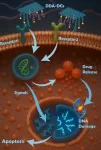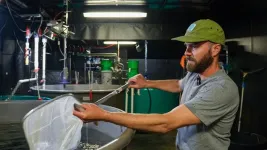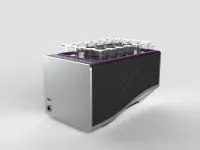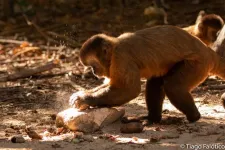(Press-News.org) How does a robotic arm or a prosthetic hand learn a complex task like grasping and rotating a ball? The challenge for the human, prosthetic or robotic hand has always been to correctly learn to control the fingers to exert forces on an object. The sensitive skin and nerve endings that cover our hands have been attributed with helping us learn and adapt our manipulation, so roboticists have insisted on incorporating sensors on robotic hands. But–given that you can still learn to handle objects with gloves on– there must be something else at play.
This mystery is what inspired researchers in the ValeroLab in the Viterbi School of Engineering to explore if tactile sensation is really always necessary for learning to control the fingers. The researchers Romina Mir, Ali Marjaninejad, Andrew Erwin and Professor Francisco Valero-Cuevas within Alfred Mann Department of Biomedical Engineering asked: how do the sensors that are part of the hand (its nature) interplay with how a hand is trained (nurtured) to learn complex tasks?
In a paper in the journal Science Advances, the team addresses the classic “nature versus nurture” question using computational modeling and machine learning. The paper “Curriculum Is More Influential Than Haptic Information During Reinforcement Learning of Object Manipulation Against Gravity” builds on the lab’s previous work related to hand evolution and artificial intelligence. It demonstrates that the sequence of learning, also known as the “curriculum,” is critical for learning to occur. In fact, the researchers note that if the curriculum takes place in a particular sequence, a simulated robotic hand can learn to manipulate with incomplete or even absent tactile sensation.
For this study, the team employed software to simulate a three-finger robotic hand to “provide a counter-example to the long-held notion that tactile sensation is always necessary” Valero-Cuevas says, and also “emphasizes the importance of the sequence of rewards for training” commented Romina Mir, who is one of two first authors and a PhD student in the ValeroLab.
“Reward guides development of the system,” said corresponding author, Francisco Valero-Cuevas who is also a professor in the Division of Biokinesiology and Physical Therapy at USC.
He added, “…just like biological systems are a product of their experience. This link between machine learning and biology is a powerful connection that may enable progress of artificial intelligence systems that can learn and adapt in the physical world.”
In this collaboration between the Viterbi School of Engineering and the University of California in Santa Cruz (UCSC), doctoral students Parmita Ojaghi (UCSC) and Romina Mir (USC) co-led this work in collaboration with Prof. Michael Wehner (UCSC). Ali Marjaninejad and Andrew Erwin (USC) also contributed to this work.
END
Nurture more important than nature for robotic hand
Paper shows that tactile sensors are less important than the order of learning experiences for embodied artificial intelligence
2025-04-03
ELSE PRESS RELEASES FROM THIS DATE:
Drug-delivering aptamers target leukemia stem cells for one-two knockout punch
2025-04-03
CHAMPAIGN, Ill. — Drug-carrying DNA aptamers can deliver a one-two punch to leukemia by precisely targeting the elusive cancer stem cells that seed cancer relapses, researchers at the University of Illinois Urbana-Champaign report.
The aptamers — short single-strand snippets of DNA that can target molecules like larger antibodies do — not only deliver cancer-fighting drugs, but also are themselves toxic to the cancer stem cells, the researchers said.
Led by Xing Wang, a U. of I. professor of bioengineering and of chemistry, the researchers documented their findings in the journal Advanced Functional Materials.
“This ...
New study finds that over 95% of sponsored influencer posts on Twitter were not disclosed
2025-04-03
New INFORMS journal Marketing Science Article Key Takeaways:
Over 95% of sponsored influencer posts on Twitter were not disclosed.
Influencer sponsorship arrangements with younger brands are less likely to be disclosed.
A large number of consumers can’t detect the sponsorship arrangement without disclosure.
The consumer-protection regulatory environment around undisclosed sponsorships has lagged behind.
BALTIMORE, MD, April 3, 2025 – New research in the peer-reviewed journal Marketing Science has found that 95% of influencer posts on Twitter (now X), which are sponsored, are not disclosed.
The ...
New sea grant report helps great lakes fish farmers navigate aquaculture regulations
2025-04-03
DULUTH, Minn.–Fish farmers across the Great Lakes states can face a confusing web of permits, policies and regulations that can hinder the growth of their operations. A new Sea Grant publication, Aquaculture Regulations in the Great Lakes, offers much-needed clarity.
The report breaks down complex legal frameworks and provides practical insights to help aquaculture producers understand and navigate state and regional requirements with greater confidence. It was developed by the National Sea Grant Law Center (NSGLC) ...
Strain “trick” improves perovskite solar cells’ efficiency
2025-04-03
Solar energy is one of the most promising solutions for reducing our dependence on fossil fuels. But making solar panels more efficient is a constant challenge. Perovskite solar cells (PSCs) have been a game-changer, offering rapid improvements in efficiency and potential for low-cost manufacturing. However, they still suffer from energy losses and operational stability issues.
The challenge with wide-bandgap perovskites
Perovskite solar cells, particularly those used in tandem configurations, rely on wide-bandgap (WBG) materials—semiconductors that absorb higher-energy ("bluer") ...
How GPS helps older drivers stay on the roads
2025-04-03
How GPS helps older drivers stay on the roads
Peer reviewed – observational study - humans
Sat Nav systems help keep older drivers on the roads for longer, according to new research from the University of East Anglia.
A new study published today reveals that over 65s with a poorer sense of direction rely more on help from GPS navigation systems such as Sat Nav or smartphone maps.
Those using GPS tended to drive more frequently - suggesting that the technology helps older people maintain driving independence.
Senior author Prof Michael Hornberger, from UEA’s Norwich Medical School, said: “Driving is usually the preferred mode of transport among ...
Estrogen and progesterone stimulate the body to make opioids
2025-04-03
Scientists have discovered a new mechanism that acts via an immune cell and points toward a different way of treating chronic pain.
Female hormones can suppress pain by making immune cells near the spinal cord produce opioids, a new study from researchers at UC San Francisco has found. This stops pain signals before they get to the brain.
The discovery could help with developing new treatments for chronic pain. It may also explain why some painkillers work better for women than men and why postmenopausal ...
Dancing with the cells – how acoustically levitating a diamond led to a breakthrough in biotech automation
2025-04-03
Engineers at a University of Bristol spin-out company have created a new technology that can move cells without touching them, enabling critical tasks that currently require large pieces of lab equipment to be carried out on a benchtop device.
The invention could accelerate the discovery of new medicines and unlock personalised medicine screening in clinics.
The groundbreaking concept was unveiled for the first time today in an article in Science published by Dr Luke Cox, where he describes his journey from University of Bristol ...
Machine learning helps construct an evolutionary timeline of bacteria
2025-04-03
University of Queensland scientists have helped to construct a detailed timeline for bacterial evolution, suggesting some bacteria used oxygen long before evolving the ability to produce it through photosynthesis.
The multinational collaboration – led by researchers from the Okinawa Institute of Science and Technology, the University of Bristol, Queensland University of Technology and UQ – focused on how microorganisms responded to the Great Oxygenation Event (GOE) about 2.33 billion years ago, which changed ...
Cellular regulator of mRNA vaccine revealed... offering new therapeutic options
2025-04-03
A team of researchers led by Dr. KIM V. Narry, director of the Center for RNA Research at the Institute for Basic Science (IBS), has uncovered a key cellular mechanism that affects the function of mRNA vaccines and therapeutics. Their study, recently published in Science, provides the first comprehensive understanding of how mRNA vaccines are delivered, processed, and degraded within cells—a breakthrough that could pave the way for more effective vaccines and RNA-based treatments.
Messenger RNA (mRNA) is the genetic blueprint that tells cells how to produce proteins. It plays a vital role in mRNA vaccines, such as those used for COVID-19, and is also a promising ...
Animal behavioral diversity at risk in the face of declining biodiversity
2025-04-03
Our environment is changing rapidly, largely as a result of human activities, leading to a significant decline in biodiversity. According to researchers from the University of Victoria and the Max Planck Institute for Evolutionary Anthropology, this decline does not only affect animal life, but also our understanding of their behavior, including tool use.
"Cultural behaviors range from the songs of whales to the tool use of primates," says Ammie Kalan of the University of Victoria. "These adaptations to environmental change not only benefit the animals, but also provide important insights into the origins of behavior and learning across species. However, shrinking ...
LAST 30 PRESS RELEASES:
Spiritual practices strongly associated with reduced risk for hazardous alcohol and drug use
Novel vaccine protects against C. diff disease and recurrence
An “electrical” circadian clock balances growth between shoots and roots
Largest study of rare skin cancer in Mexican patients shows its more complex than previously thought
Colonists dredged away Sydney’s natural oyster reefs. Now science knows how best to restore them.
Joint and independent associations of gestational diabetes and depression with childhood obesity
Spirituality and harmful or hazardous alcohol and other drug use
New plastic material could solve energy storage challenge, researchers report
Mapping protein production in brain cells yields new insights for brain disease
Exposing a hidden anchor for HIV replication
Can Europe be climate-neutral by 2050? New monitor tracks the pace of the energy transition
Major heart attack study reveals ‘survival paradox’: Frail men at higher risk of death than women despite better treatment
Medicare patients get different stroke care depending on plan, analysis reveals
Polyploidy-induced senescence may drive aging, tissue repair, and cancer risk
Study shows that treating patients with lifestyle medicine may help reduce clinician burnout
Experimental and numerical framework for acoustic streaming prediction in mid-air phased arrays
Ancestral motif enables broad DNA binding by NIN, a master regulator of rhizobial symbiosis
Macrophage immune cells need constant reminders to retain memories of prior infections
Ultra-endurance running may accelerate aging and breakdown of red blood cells
Ancient mind-body practice proven to lower blood pressure in clinical trial
SwRI to create advanced Product Lifecycle Management system for the Air Force
Natural selection operates on multiple levels, comprehensive review of scientific studies shows
Developing a national research program on liquid metals for fusion
AI-powered ECG could help guide lifelong heart monitoring for patients with repaired tetralogy of fallot
Global shark bites return to average in 2025, with a smaller proportion in the United States
Millions are unaware of heart risks that don’t start in the heart
What freezing plants in blocks of ice can tell us about the future of Svalbard’s plant communities
A new vascularized tissueoid-on-a-chip model for liver regeneration and transplant rejection
Augmented reality menus may help restaurants attract more customers, improve brand perceptions
Power grids to epidemics: study shows small patterns trigger systemic failures
[Press-News.org] Nurture more important than nature for robotic handPaper shows that tactile sensors are less important than the order of learning experiences for embodied artificial intelligence




